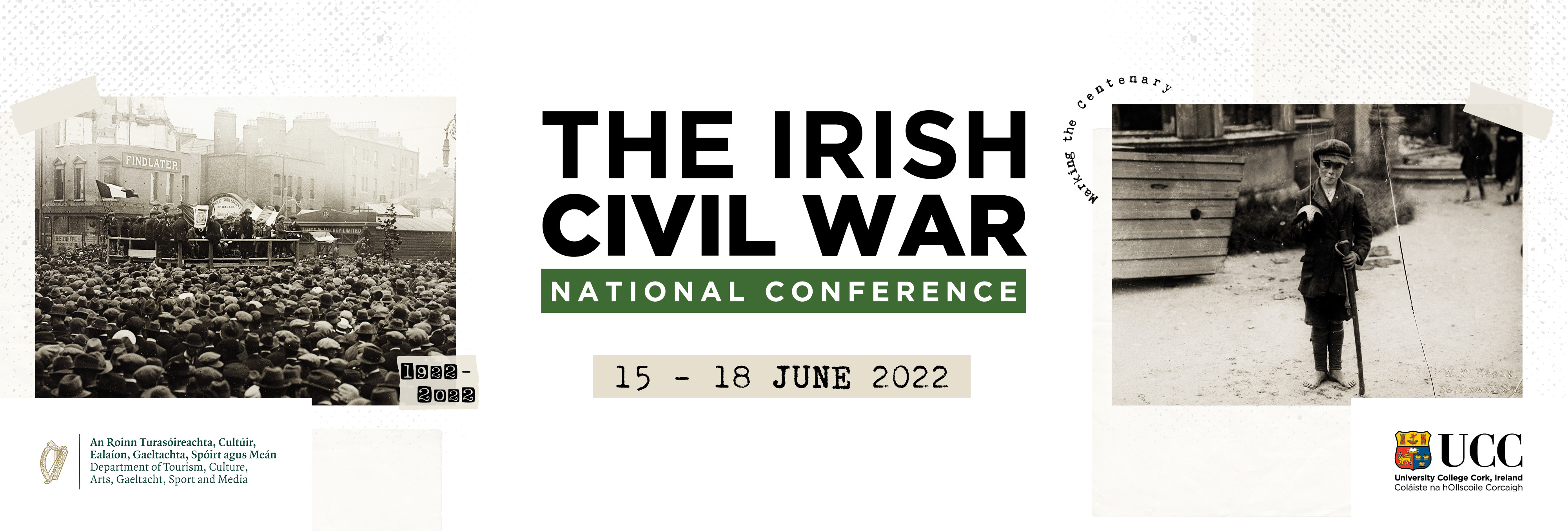On 15-18 June 2022, University College Cork hosted a national conference to mark the centenary of the Irish Civil War. Supported with funding from the Department of Tourism, Culture, Arts, Gaeltacht, Sport and Media, the four-day conference was one of the key events in the State’s Decade of Centenaries Programme for 2022. Over 130 scholars gathered on the UCC campus to explore the political, social, cultural, military, and economic dimensions to the Irish Civil War. Proceedings were open to the public, live streamed and recorded for viewing in collaboration with RTE.ie.
The Irish Civil War National Conference sought neither a single agreed narrative, nor indeed a sense of ‘closure’. Instead, it gathered together the fruits of on-going academic research into the conflict. In doing so, it sought to accomplish what the government's Expert Advisory Group on Commemorations describes as, ‘meaningful engagements with a difficult and traumatic time’.
Day 1: Wednesday 15 June
The first day proceedings opened with a welcome addresses from Dr Mervyn O'Driscoll, Head of the School of History, UCC, Professor John O’Halloran, President of University College Cork and the Lord Mayor of Cork, Councillor Colm Kelleher. An Taoiseach, Micheál Martin TD provided a Keynote address. The first day was dedciated to international comparisons to the Irish Civil War, presented in a symposium format. We heard from three senior scholars who specialise in different aspects of civil war conflicts. In the afternoon, parallel sessions in the Boole Lecture Theatres offered a selection of short (20 minute) papers organised into 4 panels focused on the Irish Civil War’s global context.
Day 2: Thursday 16 June
The second day of the conference showcased short paper responses to the conference call for papers. These 20-minute papers were presented in 80-minute panel sessions, comprised of established academics, emerging scholars and specialist speakers addressing multiple aspects of the Civil War. These sessions ran parallel with 3-4 panels per session. Panel topics included Party Politics, Class and Labour Militancy, Civil War Archaeology and Material Culture as well as biographical studies and an exploration of the Beyond 2022 project. Day 2 also featured an exhibition of historic military equipment by the Irish Defence Forces.
Day 3: Friday 17 June
The third day of the conference offered more short paper responses to the conference call for papers. These 20-minute papers were presented in 80-minute panel sessions, comprised of established academics, emerging scholars and specialist speakers addressing multiple aspects of the Civil War. Panel topics on Day 3 ranged from Civilian Trauma, Memory and the Cultural Implications of the Civil War to Military Strategies, Civil War Battlefields, Propaganda and Local Studies. These sessions ran parallel with 3-4 panels per session.
Day 4: Saturday 18 June
The final day was organised as a series of nine ‘plenary panels’ running in parallel, with each session lasting 75 minutes. The moderated panels featured three to four academic and public intellectual speakers addressing an individual theme. The designated panel themes were: Trauma, Partition, Faith, Gender, Diplomacy, Politics, Labour, Disorder and Memory.
Images from the Hogan-Wilson Collection, courtesy of the National Library of Ireland.
Conference Partners
With special thanks to


